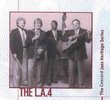| All Artists: Sergey Rachmaninov, Idil Biret Title: Rachmaninov: Etudes-Tableaux, Opp. 33 & 39 Members Wishing: 0 Total Copies: 0 Label: Naxos Original Release Date: 1/1/1991 Re-Release Date: 2/15/1994 Genre: Classical Style: Number of Discs: 1 SwapaCD Credits: 1 UPC: 730099534727 |
Search - Sergey Rachmaninov, Idil Biret :: Rachmaninov: Etudes-Tableaux, Opp. 33 & 39
 | Sergey Rachmaninov, Idil Biret Rachmaninov: Etudes-Tableaux, Opp. 33 & 39 Genre: Classical
|
Larger Image |
CD DetailsSimilar CDs
|
CD ReviewsWhen it's not the thought that counts Michael Whincop | GRIFFITH UNIVERSITY, QLD AUSTRALIA | 11/17/2000 (2 out of 5 stars) "The Rachmaninov studies have never been very lucky with the pianists performing the complete cycle. Most of the recordings are from people assigned the responsibility to do a complete Rachmaninov cycle, which often renders the interpretations a bit too dutiful. I have in mind people like Shelley, Ashkenazy, Laredo and so on. Biret's performance also is part of her cycle for Naxos. Dutiful is not the word I would use to describe it. Biret clearly has some very interesting ideas about the music which don't fall into the "default" interpretations one often hears. But in this recording, Biret's gambles don't really pay off. The first Etude is an interesting illustration. It sounds less harried than usual, the tempo a bit slower, the goosestepping left hand a bit subdued, but also less menacing. Op. 33/3 is very beautiful, but it is very slow and the first part seems to feel unconcentrated. Op. 33/5 lacks the finesse that the best Russian pianists bring to the flickering figures in the upper tessitura. Op. 33/6 and op. 33/8 illustrate some of the things that cause me to dislike this set. It has to do with Biret's phrasing. It can be quite choppy and often lacks legato, and there is a tendency to add unnecessary ritardandi to some of the big chordal passages. There are similar examples in op. 39 (e.g., nos 1, 4, 5, 9). Two Etudes that I found unattractive are nos 3 and 7, which are just about my favourites in the whole set. No. 3 can often be a bit overpressed, but Biret turns in an account that sounds like a slack scherzando, rather than a glittering toccata. In no. 7, Biret is TWICE as slow as Ashkenazy - she takes an astonishingly interminable 11:18, compared to Ashkenazy's 5:33 (the mean is a bit over 7 minutes). It just doesn't work, either. The work sounds like it has been pulled apart. So I'm frankly disappointed with Biret - who can be very good in Chopin and Brahms, and gives a marvellous Symphonie Fantastique. The recording is OK but a bit close and harsh on fortes. My recommendation in the Etudes is to go for Nikolai Lugansky on Vanguard/Fidelio, if you can find him. Freddy Kempf's op. 39 on BIS is also very fine, and I look forward to his op. 33 some day. A special wish: I hope APR releases Fiorentino's LP recordings." Los Angeles Times review Michael Whincop | 10/03/2001 (5 out of 5 stars) "LOS ANGELES TIMES In the RCA (10 CD) set Rachmaninoff plays, and grandly, several of his "Etudes Tableaux" for solo piano: subtle works of great harmonic daring written between 1911 and 1917. The new recording of all 17 of them by Turkish pianist Idil Biret is a rewarding, even invaluable supplement. Biret, a pianist of prodigious power and intelligence, brings a fierce rhythmic drive and, when needed, percussive edge to music more than anything else shows her as a major contributor to the 20th Century piano technique. The disc is another super budget winner on the Naxos label, admirable both for quality of performance and natural, incisive piano reproduction.Herbert Glass October 25th 1992" Biret is brilliant Yi HW | a cosmopolitan bound by the ROK nationality | 04/04/2006 (5 out of 5 stars) "Yes. Biret has 'Prodigious power and intelligence' to play Rachmaninov. Her approach is highly inspiring. Very sensitive here and very fiery there. Improvisation she does makes her playing more intense.
I have some Etudes-Tableaux by other performers but only a few make me satisfied. Andsnes is cold and unispiring. Lugansky is ordinary and uses sustain pedal unnecessarily much. Also, tone is too bright and brittle. Laredo is unexpectedly dissapointing by not showing any special point. Ovchinikov is slow and weak. Ashkenazy, Shelly and composer himself are on the top in the town. And they are closely followed by Biret." |

 Track Listings (17) - Disc #1
Track Listings (17) - Disc #1


